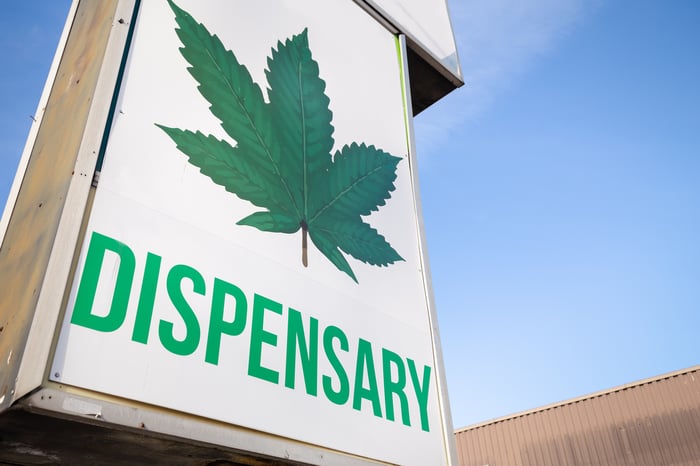All eyes are on the Canadian marijuana industry -- and for good reason. Last year, it became the first industrialized country in the world to legalize recreational cannabis. Once the industry is fully up and running, it should be capable of up to $6 billion in annual sales by 2022, according to various Wall Street estimates.
But even with the U.S. federal government maintaining a strict Schedule I classification on pot, the U.S. marijuana market is no pushover. It, too, is budding before our eyes and is fully capable of leaving the Canadian pot market eating its dust if state-level legalizations continue. Today, 33 U.S. states have given the green light to medical marijuana, with 10 also allowing recreational consumption.

Image source: Getty Images.
Acquisition activity in the U.S. dispensary space is really picking up
Given that the U.S. marijuana market could dwarf Canada's, perhaps it's no surprise that the most aggressive acquisition and merger activity can be seen among vertically integrated cannabis dispensary operators. By vertically integrated, I mean a company that completely controls its supply chain, including growing and processing marijuana within the state(s) that it's also retailing the product. Since cannabis can't be transported across state lines, per federal law, this vertical integration is a means of keeping costs down while controlling production quality.
Although we've witnessed no shortage of deals in this space, no company has been more aggressive than Harvest Health & Recreation (HRVSF).
For those who may not recall, Harvest Health made headlines five weeks ago when it announced the largest marijuana deal in U.S. history: an $850 million all-stock deal to buy privately held Verano Holdings.
Assuming it's completed, the combination would have 30 open retail dispensaries, eight grow farms, and seven processing facilities. But by the end of 2019, the combination should have 70 open retail stores, 13 grow farms, and 13 processing facilities. Not to mention Verano allows for total cultivation expansion capacity of 900,000 square feet in Illinois, Nevada, and Maryland.
Ultimately, it's the peak potential of the Harvest Health-Verano combination that's so exciting. Once complete, the duo would hold 123 retail store licenses and close to 200 total licenses (including grow farms and processing facilities), collectively, in 16 states. Although Acreage Holdings still holds the lead in terms of total state presence at 19, no other publicly traded dispensary is within a stone's throw of Harvest Health in terms of retail licenses held.

Image source: Getty Images.
The largest U.S. dispensary keeps getting bigger
However, Harvest Health isn't done just yet. Last week, the largest U.S. dispensary in terms of store licenses announced that it was acquiring privately held CannaPharmacy, which owns or operates cannabis licenses in four northeastern U.S. states. CannaPharmacy holds one of the 12 awarded fully vertical licenses for cultivation, sales, and manufacturing in New Jersey, as well as one of three vertical licenses in Delaware. It also has operations in Pennsylvania and Maryland.
The end result of this deal is an increase in total facility licenses to 213 (this includes grow farms and processing facilities), and a bump up in retail store licenses to 130 from 123. That's over four dozen more retail dispensary licenses than MedMen Enterprises (MMNFF) and close to five dozen more than Curaleaf Holdings.
Harvest Health is financing this deal with cash from a $500 million brokered convertible note offering announced just two weeks ago. This financing is being doled out in five separate $100 million tranches over a period of up to 18 months. Said CEO Steve White:
We're seeing significant M&A activity across our industry, but the most important factors are the price one pays for an acquisition, strength of the assets relative to the market size and synergies between the companies. Harvest was already fully funded to build out our entire footprint, inclusive of the significant assets that come with the Verano acquisition. Our recent $500 million financing, secured in $100 million tranches for new accretive acquisitions like CannaPharmacy, continues to solidify Harvest's position as the leading company in the cannabis industry in reach, brands, infrastructure, assets and footprint.

Image source: Getty Images.
A premier presence, but the jury is still out on its acquisitions
There's little doubt that Harvest Health's acquisitions should allow it to outpace its peers in terms of physical dispensary presence in legal marijuana states. That's fantastic news considering that, through the first nine months of fiscal 2018, it was profitable on an operating basis, sans one-time benefits, costs, and fair-value adjustments. With most dispensaries losing exorbitant amounts of money on an operating basis (i.e., MedMen), this places Harvest far above much of its competition.
But is Harvest Health a landslide winner among publicly traded U.S. dispensaries? Not necessarily. A lot is going to depend on how the company recognizes goodwill following the closing of its Falcon International (a cannabis distribution company in California), Verano, and CannaPharmacy buyouts. Although White is confident in the value Harvest Health is getting from its acquisitions, the trend throughout the industry is that these companies are grossly overpaying for growth.
For example, iAnthus Capital Holding (ITHUF -2.02%) ended 2018 with $168.4 million in total assets, although this doesn't include the recently completed MPX Bioceutical acquisition. Of this $168.4 million, $37.4 million is tied up in goodwill, with another $56.5 million recognized as intangible assets. For iAnthus Capital shareholders, there are zero assurances that the company will be able to recoup this value, which is worrisome for a company that just recorded a $62 million net loss in 2018. With the MPX deal closer to $600 million in value, iAnthus Capital's goodwill could soar when it reports its first-quarter operating results.
Similar worries exist with MedMen, which is in the process of acquiring privately held PharmaCann for $682 million in an all-stock deal. MedMen has done an excellent job generating strong sales per square foot in its existing locations, and it currently has only a negligible amount of goodwill on its balance sheet. However, it's unclear whether MedMen will recoup significant value from spending $682 million on a company that had only 18 retail store licenses at the time the deal was announced.
This is an exciting and fast-paced industry -- no doubt about it. But Harvest Health still has plenty to prove before becoming a viable investment opportunity.





